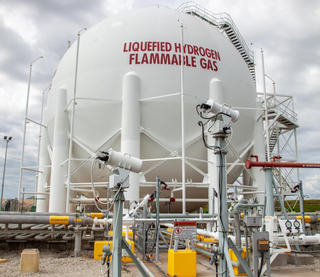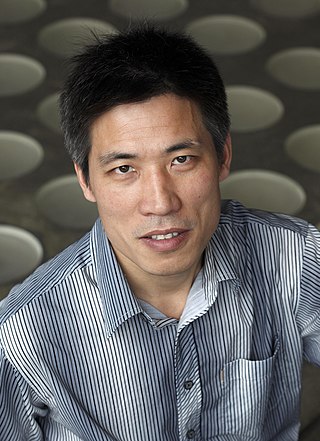
The hydrogen economy is an umbrella term for the roles hydrogen can play alongside low-carbon electricity to reduce emissions of greenhouse gases. The aim is to reduce emissions where cheaper and more energy-efficient clean solutions are not available. In this context, hydrogen economy encompasses the production of hydrogen and the use of hydrogen in ways that contribute to phasing-out fossil fuels and limiting climate change.
Climate engineering is the intentional large-scale alteration of the planetary environment to counteract anthropogenic climate change. The term has been used as an umbrella term for both carbon dioxide removal and solar radiation modification when applied at a planetary scale. However, these two processes have very different characteristics, and are now often discussed separately. Carbon dioxide removal techniques remove carbon dioxide from the atmosphere, and are part of climate change mitigation. Solar radiation modification is the reflection of some sunlight back to space to cool the earth. Some publications include passive radiative cooling as a climate engineering technology. The media tends to also use climate engineering for other technologies such as glacier stabilization, ocean liming, and iron fertilization of oceans. The latter would modify carbon sequestration processes that take place in oceans.

Coal pollution mitigation, sometimes labeled as clean coal, is a series of systems and technologies that seek to mitigate health and environmental impact of burning coal for energy. Burning coal releases harmful substances that contribute to air pollution, acid rain, and greenhouse gas emissions. Mitigation includes precombustion approaches, such as cleaning coal, and post combustion approaches, include flue-gas desulfurization, selective catalytic reduction, electrostatic precipitators, and fly ash reduction. These measures aim to reduce coal's impact on human health and the environment.

Carbon capture and storage (CCS) is a process by which carbon dioxide (CO2) from industrial installations is separated before it is released into the atmosphere, then transported to a long-term storage location. The CO2 is captured from a large point source, such as a natural gas processing plant and is typically stored in a deep geological formation. Around 80% of the CO2 captured annually is used for enhanced oil recovery (EOR), a process by which CO2 is injected into partially-depleted oil reservoirs in order to extract more oil and then is largely left underground. Since EOR utilizes the CO2 in addition to storing it, CCS is also known as carbon capture, utilization, and storage (CCUS).
Hydrogen gas is produced by several industrial methods. Nearly all of the world's current supply of hydrogen is created from fossil fuels. Most hydrogen is gray hydrogen made through steam methane reforming. In this process, hydrogen is produced from a chemical reaction between steam and methane, the main component of natural gas. Producing one tonne of hydrogen through this process emits 6.6–9.3 tonnes of carbon dioxide. When carbon capture and storage is used to remove a large fraction of these emissions, the product is known as blue hydrogen.

Several methods exist for storing hydrogen. These include mechanical approaches such as using high pressures and low temperatures, or employing chemical compounds that release H2 upon demand. While large amounts of hydrogen are produced by various industries, it is mostly consumed at the site of production, notably for the synthesis of ammonia. For many years hydrogen has been stored as compressed gas or cryogenic liquid, and transported as such in cylinders, tubes, and cryogenic tanks for use in industry or as propellant in space programs. The overarching challenge is the very low boiling point of H2: it boils around 20.268 K (−252.882 °C or −423.188 °F). Achieving such low temperatures requires expending significant energy.
Carbon capture and storage (CCS) is a technology that can capture carbon dioxide CO2 emissions produced from fossil fuels in electricity, industrial processes which prevents CO2 from entering the atmosphere. Carbon capture and storage is also used to sequester CO2 filtered out of natural gas from certain natural gas fields. While typically the CO2 has no value after being stored, Enhanced Oil Recovery uses CO2 to increase yield from declining oil fields.
The National Nuclear Laboratory is a UK government owned and operated nuclear services technology provider covering the whole of the nuclear fuel cycle. It is fully customer-funded and operates at six locations in the United Kingdom. Its customers have included the Nuclear Decommissioning Authority, Sellafield Ltd, Westinghouse, the Health and Safety Executive, the Ministry of Defence, the UK Atomic Energy Authority, VT Nuclear and British Energy. It also has links with academia, including collaborative agreements on waste immobilisation and disposal with the University of Sheffield and on nuclear materials research with the University of Manchester.
The milestones for carbon capture and storage show the lack of commercial scale development and implementation of CCS over the years since the first carbon tax was imposed.

Bioenergy with carbon capture and storage (BECCS) is the process of extracting bioenergy from biomass and capturing and storing the carbon dioxide (CO2) that is produced.
Carbon Sciences is a public corporation based in Santa Barbara. The company was founded in 2006 and incorporated as Zingerang, Inc. Originally, the company was involved in mobile communication, but has since switched to developing CO2 to fuel technology. Calcium carbonate, CaCO3, was briefly looked at as another end product of CO2 recycling. On April 2, 2007, the name was changed to Carbon Sciences Inc. Their process differs from other projects in that it does not utilize high pressure or high temperature. This would be a significant advantage when trying to scale the technology up to commercial production.
The Nigeria Prize for Science is a Nigerian science award given annually since 2004 for excellence in science breakthroughs. It is the country's highest scientific award. The award is sponsored by Nigeria LNG Limited. The prize describes itself as "bringing Nigerian scientists to public attention and celebrating excellence in scientific breakthroughs".
Carbon-neutral fuel is fuel which produces no net-greenhouse gas emissions or carbon footprint. In practice, this usually means fuels that are made using carbon dioxide (CO2) as a feedstock. Proposed carbon-neutral fuels can broadly be grouped into synthetic fuels, which are made by chemically hydrogenating carbon dioxide, and biofuels, which are produced using natural CO2-consuming processes like photosynthesis.

Nigeria Prize for Literature is a Nigerian literary award given annually since 2004 to honor literary erudition by Nigerian authors. The award rotates among four genres; fiction, poetry, drama and children's literature, repeating the cycle every four years. With the total prize value of US$100,000 to individual winner, it is the biggest literary award in Africa and one of the richest literary awards in the world.
Camille Petit is a Reader in Materials Engineering at Imperial College London. She designs and characterises functional materials for environmental sustainability.
Professor Mercedes Maroto-ValerFRSE FRSCFIChemEFRSA FEI is Champion and Director of the UK Industrial Decarbonisation Research and Innovation Centre (IDRIC) focused on accelerating the transition to net zero of the UK largest industrial clusters and establishing the first world net-zero industrial cluster. Maroto-Valer is Deputy Principal at Heriot-Watt University, leading institutional and global changes in sustainability, making an impact on achieving the United Nations Sustainable Development Goals and working with partners to achieve global carbon reduction targets. She is also director of the Research Centre for Carbon Solutions (RCCS) at Heriot-Watt University, where she holds the Robert Buchan Chair in Sustainable Energy Engineering. RCCS that is a multidisciplinary centre delivering innovation for the wider deployment of low-carbon energy systems required for meeting net-zero targets. Her track record covers energy systems, CCUS carbon dioxide capture and storage, integration of hydrogen technologies and low carbon fuels. Her work has been recognised through various awards and prizes, including the Philip Leverhulme Prize for Engineering in 2009.

Junwang Tang, MAE, FRSC and FIMMM, is the Founding Director of Industrial Catalysis Center, and Carbon Neutrality Chair Professor of Materials Chemistry and Catalysis at the Department of Chemical Engineering, Tsinghua University and Visiting Professor at University College London (UCL). He also served as the Director of the University Material Hub at UCL (2016–2019).

Zero is a manufacturer of non-biological e-fuel claimed to be carbon-neutral co-founded by former Formula One engineer Paddy Lowe. Its product has been developed as an alternative to fossil-based fuels and a more scalable sustainable alternative to waste and bio-fuels. The Royal Air Force used its fuel in November 2021 to achieve a World Record first flight powered by synthetic fuel. In July 2022, Zero entered a new partnership with the Royal Air Force to move towards mass production of sustainable aviation fuel.
The Carbon Connect Delta Program is a proposed carbon sequestration program to aid Belgium and the Netherlands in achieving carbon neutrality by 2030. It aims to capture, transport, and store 6.5 million tones of CO2 by 2030 using carbon capture and storage (CCS) in the transboundary area of the North Sea Port area of the Scheldt-Delta region connecting Belgium and the Netherlands.








